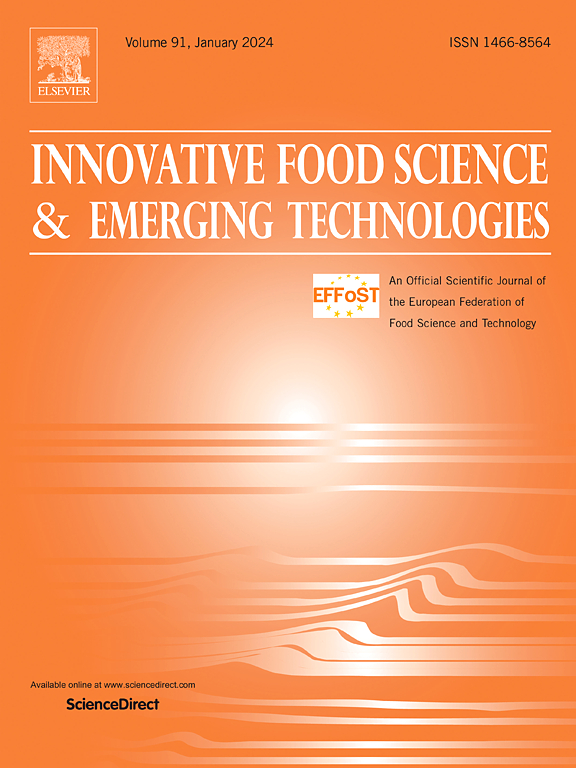Spontaneous germination of superdormant Bacillus subtilis spores under high hydrostatic pressure: Influencing factors and underlying mechanism
IF 6.3
1区 农林科学
Q1 FOOD SCIENCE & TECHNOLOGY
Innovative Food Science & Emerging Technologies
Pub Date : 2025-01-27
DOI:10.1016/j.ifset.2025.103937
引用次数: 0
Abstract
High hydrostatic pressure (HHP) as an advanced non-thermal food processing technology, can induce bacterial spores to germinate and reduce their resistance, and these germinated spores can be effectively inactivated by subsequent mild treatments such as pasteurization. This method for spore inactivation is known as the “germinate to eradicate” strategy. However, the presence of superdormant (SD) spores, which do not germinate under HHP and are referred to as high-pressure superdormant (HPSD) spores, poses a challenge to the successful implementation of this strategy. Hence, gaining insights into the characteristics of HPSD spores is crucial for their elimination. In this study, we reported that HPSD Bacillus subtilis spores isolated after 500 MPa/15–35 °C/3–5 min treatment (500 MPa-SD) showed spontaneous germination when incubated in sterile distilled water at 4 °C–37 °C, indicating the instability of these SD spores. Notably, elevating the 500 MPa treatment temperature from 15 °C to 35 °C, or increasing the incubation temperature from 4 °C to 37 °C, could enhance the efficiency of spontaneous germination of 500 MPa-SD spores. Additionally, we discovered that the germinant receptor GerA was crucial for the occurrence of spontaneous germination of 500 MPa-SD spores. Meanwhile, the 500 MPa-SD spores with GerA showed a substantial decrease in potassium ions and reduced heat resistance. These observations suggested that the 500 MPa-SD spores, at least a proportion of them, had an activated GerA, entering commitment state that led to irreversible spontaneous germination.
Industrial relevance: The existence of SD spores greatly limits the successful application of HHP technology in low-acid foods processing. The new insights gained from this work are valuable for understanding the properties of the HPSD spores and could potentially pave the way for the development of innovative methods to effectively inactivate bacterial spores in industrial HHP food processing systems.
超休眠枯草芽孢杆菌孢子在高静水压力下的自发萌发:影响因素及机制
高压静水(High hydrostatic pressure, HHP)作为一种先进的非热食品加工技术,可以诱导细菌孢子萌发并降低其抗性,这些萌发的孢子可以通过后续的温和处理(如巴氏杀菌)有效灭活。这种灭活孢子的方法被称为“发芽根除”策略。然而,超休眠(SD)孢子的存在,它们在高温高压下不发芽,被称为高压超休眠(HPSD)孢子,对这一策略的成功实施提出了挑战。因此,深入了解HPSD孢子的特征对消灭它们至关重要。在本研究中,我们报道了500 MPa/ 15-35°C/ 3-5 min处理后分离的HPSD枯草芽孢杆菌孢子(500 MPa-SD)在4°C - 37°C的无菌蒸馏水中培养时能够自发萌发,说明这些SD孢子具有不稳定性。将500 MPa处理温度从15℃提高到35℃,或将培养温度从4℃提高到37℃,均能提高500 MPa- sd孢子的自发萌发效率。此外,我们发现萌发受体GerA在500 MPa-SD孢子的自发萌发中起着至关重要的作用。同时,经GerA处理的500 MPa-SD孢子钾离子含量显著降低,耐热性降低。这些观察结果表明,500个MPa-SD孢子,至少有一部分,具有激活的GerA,进入承诺状态,导致不可逆的自发萌发。工业相关性:SD孢子的存在极大地限制了HHP技术在低酸食品加工中的成功应用。从这项工作中获得的新见解对于理解HPSD孢子的特性是有价值的,并且可能为开发创新方法来有效灭活工业HHP食品加工系统中的细菌孢子铺平道路。
本文章由计算机程序翻译,如有差异,请以英文原文为准。
求助全文
约1分钟内获得全文
求助全文
来源期刊
CiteScore
12.00
自引率
6.10%
发文量
259
审稿时长
25 days
期刊介绍:
Innovative Food Science and Emerging Technologies (IFSET) aims to provide the highest quality original contributions and few, mainly upon invitation, reviews on and highly innovative developments in food science and emerging food process technologies. The significance of the results either for the science community or for industrial R&D groups must be specified. Papers submitted must be of highest scientific quality and only those advancing current scientific knowledge and understanding or with technical relevance will be considered.

 求助内容:
求助内容: 应助结果提醒方式:
应助结果提醒方式:


